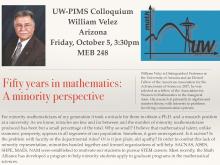For minority mathematicians of my generation it took a miracle for them to obtain a Ph.D. and a research position at a university. As we know, miracles are few and far between and the number of minority mathematicians produced has been but a small percentage of the total. Why so small? I believe that mathematical talent, unlike economic prosperity, appears in all segments of our population. Somehow, it goes unrecognized. Is it racism? Is the problem with faculty or the departmental rules? Or is it just plain, old apathy? In order to combat this lack of minority representation, minorities banded together and formed organizations of self-help. SACNAS, AISES, SHPE, MAES, NAM were established to motivate our students to pursue STEM careers. Most recently, the Math Alliance has developed a program to help minority students apply to graduate programs in the mathematical sciences.
Slides from the talk: http://faculty.washington.edu/jathreya/Fifty years in mathematics-UW.pptx
William Vélez is Distinguished Professor at the University of Arizona and an Elected Fellow of the American Association for the Advancement of Science. In 2017, he was selected as a fellow of the Association for Women in Mathematics in the inaugural class. His research is primarily in algebra and number theory, with interests in problems involving communication systems.
